name of abortion pill in u
name of abortion pill in u
charamin.jp order abortion pill online usa
buy amoxicillin canada
amoxicillin prescription no
insurance mixing ibuprofen and weed
mixing
adderall and weed
Presentation to the Astrological Lodge, London November 2006
Ruling Planets : Why ? How ?
.. and what about Pluto, Mars and Earth ?
Does Astrology Work ?
I learnt to read charts after studying Jung’s Four Functions, thinking, feeling, sensation and intuition which are apparently cribbed from astrology. My initial interest in horoscopes was fairly sceptical : I wanted to see if they really worked according to the rules : did the House cusps work ? what happened on Sign cusps ? did the planets really rule the Signs and why ? or how ? I could see that my own chart, and others, were basically accurate psychological portraits but, after two or three thousand years, and especially a rather recent modern renaissance, had we really got it all right or were we sometimes accepting things too readily ? I suppose I was encouraged by an impressive, if enigmatic, mentor who suggested Pluto might not rule Scorpio after all but I was living in a vibrant community of travellers including several apprentice astrologers, high in the Himalayas where one feels free to think the unthinkable. So that’s what I did.
Physical Planets, Metaphysical Spirits
One of my first thoughts was the simple idea that the physical natures
of the planets should be the basis for their metaphysical, astrological characters. The Sun is the obvious starting point : Leo is defined elementally as the constant fire. The Moon was less obvious but motion and shape-changing are among the great characteristics of Cancer’s mountain streams, the first form of water.
Similarly Mercury’s orbit is quick and mobile, the messenger who can speak from the fiery heart of things but whose Gemini duality is mirrored by his two sides, the other cold and turned to the wandering planets while his rich array of mineral wealth reflects Virgo’s element.
Venus is shrouded in a dazzling mantle of clouds with a dynamic wind system of super-hurricanes at high altitude down to the gentlest zephyrs which should alert us to the irresistible power and variety of the balancing breezes we associate with Libra : the irresistible power of feminine skills in harmonising relationships. Venus’ striking topography proclaims the glories of the physical earth element in an apparently rather young and active geology echoing Aphrodite’s bloom of youth.
Earth doesn’t usually figure in the horoscope and Mars might be rather contentious, so, trying to keep the temperature down till nearer the end(!) we’ll cruise on to Jupiter. We can’t really understand too much of Jupiter’s complex composition but nearer the surface we know there is a tremendous swirling riot of storms of which the great red Spot is only the largest, all boasting superbolts of lightening and truly deafening thunder. Certainly we now know Jupiter’s physical character corresponds closely to his divine and astrological nature, the horoscope’s planet of storms (both meteorological and temperamental) and the ancients’ representations of this planet, whether as Zeus, Thor or Marduk, with the thunderbolt always his characteristic weapon.
Saturn’s Aquarian Air is particularly pronounced with his deep swirling, but dusty clouds, ‘cold and dry’ just as William Lilly described the planet but especially the incredible electro-magnetic aerial circus of his extraordinary ring system. This involves the kind of dynamics and wave patterns which completely baffle physicists, a stupendous upstaging of the electronic wizardry we associate with the new Age of Aquarius on Earth.
Eccentricity is one of the marks of a Uranian character and every astronomer comments on the ‘eccentricity’ of Uranus’ rings and indeed its axis of rotation, aligned together at a right angle to the plane of its orbit. True to its Aquarian nature it does have a thick atmosphere with weather systems rotating rather independently, oddly unsupported by any heat source.
Neptune also has a substantial atmosphere boasting enormous storm systems which should come as no surprise to sailors or Pisceans and any of us who venture the unsteady realms of the Fishes King. Beneath this dynamic atmosphere there is a vast, profound ocean of liquid water and ice, although we have to recognise this is very similar to Uranus.
The next planet is inscrutable Pluto so again, I’ll save that up for now !
Physics and Metaphysics Both Confound the Experts
I have only hinted at some of the close correspondences between planets’ rulerships and their physical natures but I have ignored other features which don’t fit so clearly. We cannot expect to be definitive on this when even the experts are still like little children, bemused and baffled, especially in understanding the outer giants where the physics starts to look a bit mystical.
The principle of this physical / metaphysical correspondence is more forcefully presented by the logic of its theory. ‘As above, so below’ defines humanity as star children but also implies that the higher metaphysical character will reflect the physical nature; for instance a powerful Piscean spirit in the vast elemental waters of the ocean. And vice-versa, strong Sun aspects to the Ascendant are often marked by Phoebus’ indelible kisses, a rash of freckles, or the equally merciless curse, the natural blonde bleach.
The Music of the Spheres
Renaissance astrologer Robert Fludd's
illustration of 'the music of the spheres.'
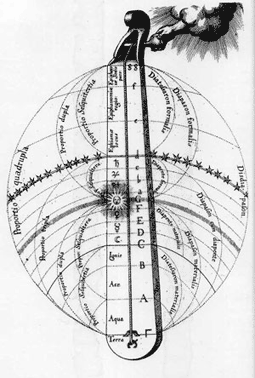
We might also consider that the position, particularly of the outer planets, is
another vital factor in their astrological characters. Pythagoras’ ancient phrase, ‘the music of the spheres’ reminds us of his profound association of music and mathematics, supported by both Plato and Kepler. He believed in the divine intervals of the planets determining their character or tone, just as the length of a string determines the pitch of a note but we now know details of the planets’ size and composition which Pythagoras couldn’t know, prompting the observation that the thickness and material of the string are also significant factors. Perhaps the position serves to highlight those planetary features which naturally reflect a particular Sign and even to transform the influence of others. The Tree of Life also reveals a clear correspondence between the planets and the musical scale but we’ll return to the Tree again later.
The Solar Zodiac
Now we get to the point of all this : how does rulership work, or rather, why does rulership work ? This is almost like asking how does astrology work ! Against an eternal barrage of scepticism, it’s been pretty much enough for astrologers over the ages to simply recognise what does work in astrology. But perhaps at the dawning of the Aquarian age, (two millennia dedicated to the heavens and their invisible energies !) we should now be trying to apply modern scientific reasoning to understand just how these metaphysical energies work.
Few now think the power of astrology, the Signs, comes from the stars. We can imagine some kind of ‘higher’ energy emanating from the great bodies of the planets but a great big question remains in many people’s minds as to how the Signs work. Rather rashly I’m going to attempt an answer which I commend to you as no more than stating the obvious.
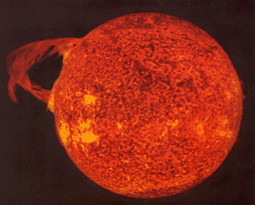 We all recognise the overwhelming power of the Sun to moment by moment sustain all life on Earth, physically and, through the power of his spirit, astrologically. Every cell pulses with the knowledge of the Sun because that is the Source of all life, all energy. His passage through the heavens is everything in our lives, to an extent far beyond the totality we are conscious of. It seems that the Sun’s apparent annual progress around the Earth somehow creates an indelible impression on the collective (unconscious) consciousness of all Creation on Earth so that each section of the heavens, along the ecliptic, takes on a particular character according to the Sun’s passage there. This imprinting must be rather subtle though it might be compared to what we try to avoid with computer screen savers, burning an image on the screen but certainly sub-atomic science, not to mention recent planetary probes, have taught us to expect and accept the inexplicable.
We all recognise the overwhelming power of the Sun to moment by moment sustain all life on Earth, physically and, through the power of his spirit, astrologically. Every cell pulses with the knowledge of the Sun because that is the Source of all life, all energy. His passage through the heavens is everything in our lives, to an extent far beyond the totality we are conscious of. It seems that the Sun’s apparent annual progress around the Earth somehow creates an indelible impression on the collective (unconscious) consciousness of all Creation on Earth so that each section of the heavens, along the ecliptic, takes on a particular character according to the Sun’s passage there. This imprinting must be rather subtle though it might be compared to what we try to avoid with computer screen savers, burning an image on the screen but certainly sub-atomic science, not to mention recent planetary probes, have taught us to expect and accept the inexplicable.
Jung discovered a similar mechanism in ‘archetypes,’ the imprint of powerful collective images, such as the father, which colour our impressions of individuals. The Sun’s role is somewhat stronger even than that of the father (!) and this seems to create a similar ‘ archetypal impression,’ the Signs corresponding closely with the solar seasons.
Recognising it all comes from the Sun of course suggests a very similar mechanism for the Signs to that which apparently creates the Houses. Both are overwhelmingly created by the Sun’s apparent revolutions and the daily circuit of the Sun is divided into the Twelve Houses’ terrestrial ‘work-a-day’ versions of the Twelve Signs.
Above all recognising the solar origin of the zodiac accords with the ‘precession of the equinoxes,’ measuring the tropical zodiac from the Sun’s changing position at the spring equinox. So the Sun apparently determines the characters of the Signs but does it give them their energy, their power ? What about rulership ?
Solar Zodiac but Planetary Power
The law of rulership is quite extraordinary but it certainly works. We can often explain the flaws in the character of someone with a strong chart by looking at the ruler of their Sun or Moon Signs. Hitler’s horoscope looks quite good but there is a nasty little square between Saturn and Venus, ruling his Moon and Sun Signs. Every factor in the position of Venus does affect everything in the Sign of Taurus and realistically, this can mean only one thing.
The logical explanation is to say that the Sign of Taurus is only realised or materialised through the planet Venus. Venus must embody the primary source of ‘the spirit of Taurus,’ its metaphysical, astrological nature. Just as our fathers don’t create but do embody, carry, and strongly affect the archetype of the father. It is basic astrology to recognise Venus’ Taurean nature and I have suggested we can attribute the astrological characters of the planets to their physical natures. The physical as the basis for the metaphysical. So the power of the Signs comes from, and through, their ruling planets, exciting some kind of resonance.
In India, their age-old spiritual, metaphysical understanding recognises a Universal Spirit within all Creation, even the rocks. Other theologies, notably Christianity, are only just beginning to catch up and recognise this pantheism but astrology could not realistically work without this ethereal Spirit Supreme residing within all Creation, for it carries with it the full spectrum of the elements, air, fire and water hidden within the physical earth spirit. So every rock has its predominantly Capricorn spirit but it will also have a little bit of God in there too, according to the Magi. With bodies the size of Venus, say, or Neptune, that’s an awful lot of spirit, of one Sign or another.
This basic metaphysics explains why a Sign is so comprehensively affected by the position (aspects, House and Sign) of the ruler.
Planetary Rulership Symbols
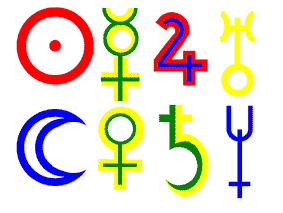 Let me introduce you to my original versions of the planet symbols, illustrated on the Tree of Life. Logically I believe we should take things a little further to say quite clearly that if the Signs are materialised by their ruling planets, then the Signs define the planets. End of story. This seems to be the inescapable logic of rulership.
Let me introduce you to my original versions of the planet symbols, illustrated on the Tree of Life. Logically I believe we should take things a little further to say quite clearly that if the Signs are materialised by their ruling planets, then the Signs define the planets. End of story. This seems to be the inescapable logic of rulership.
We shouldn’t expect to find any special character outside the spectrum of the zodiac. The combinations of the astrological spirits may be infinite but they are all taken from the palette of the twelve Signs. We shall see shortly that even the Bible tells us the twelve Signs and ten, or eleven (!), planets of the horoscope, yield just ‘twelve manner of fruit.’ So Jupiter is that heady mix which is purely Pisces and Sagittarius, lots of each and lots of the wonderful and volatile combination of the two, hence his generosity.
These symbols seem to work quite well in reflecting the true nature of the planets. Aquarius is our age, the age of the stars but it is also the age of rationalism and openness and we must be prepared to make astrology much clearer, much less esoteric, much more scientific and objective. Like psychology, it will always remain subtle and deep, and, yes, subjective, in many respects.
If the significance of the rulership of the Signs is not always clear, the rulership of the Houses is certainly a fraught subject, open to a wide variety of interpretations, or none. But House rulership must follow an obvious logic. If the characters of the Twelve Houses correspond to the spirits of the Twelve Signs, then their rulership must follow similarly from the same ruling planets. Merely with a more terrestrial definition, coloured by the cycle of daily life.
Inscrutable Pluto ?
OK, so having hopefully shed some light on the mechanics of rulership, it’s time to grasp the nettle and get onto the most exciting part of this presentation. As I said in my blurb, in the twentieth century most astrologers decided to drop Mars' age-old rulership of Scorpio and replace it with Pluto. Were the ancients making it up or are we?
My impression is that when Pluto’s name was decided, astrologers simply reckoned the Lord of the Dead must belong with the Sign of death and rebirth, and the infamous Eighth House, the morbid House of Death ! Where else could he go ? But did we ever wonder if Pluto had even been rightly named ? Did the name fit his astrological character ?
Well, I believe we have adopted the right astrological names for these new planets and I’m glad we haven’t needed to correct the astronomers ! But perhaps we do need to correct ourselves and that seems almost as daunting a task ! Please bear with me on this if I presume to ask these awkward questions and especially if I dare to give some even more awkward answers. It should at least be a healthy exercise if we can ask these big, basic questions ! Incidentally, I’ll just make it clear that I don’t reject these modern rulerships, like some Traditional astrologers. On the contrary : I think we’re only just catching up with the ancients. But I do believe we may have got one of them slightly inaccurate !
Well, with my Sun in the Eighth House I have to doubt Pluto can cope with all the fun of that intensely exciting domain ! …. but let us consider further.
Pluto was the Lord of the distant land of the dead, the realm beyond this world. This is rather different from the swift end which is death as we see it. Scorpio is rightly associated with that finality of the stroke of death, execution, or simply breathing your last, the end of everything (as we know it !) What else can we say of Pluto ? The name is apparently derived from Plutus, the Greek god of wealth, still commemorated in the topical term, plutocrats, the wealthy and powerful, which doesn’t sound at all Scorpionic.
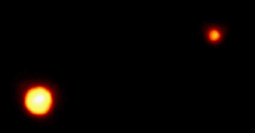
What of the planet then ? It is an enigma but we know it has a particularly erratic orbit, much the farthest outpost of our system which nevertheless ventures at times well within the orbit of Neptune, wandering massively between thirty and fifty Astronomical Units from the Sun, it also has a strangely inclined orbit which takes it well above and below the usual plane of the planets’ orbits, and it even manages to rotate in the opposite direction to most other planets, and at an extraordinary angle. Strange upon strangeness. Recently NASA has even classified it as a ‘double planet’ because of the comparative closeness of its size to that of its moon, Charon.
NOT a Minor Planet
And of course it has very recently been re-classified as a minor planet, assigned the number 134340 in the minor planet catalogue. Let’s just make it clear that we astrologers believe this is a big mistake ! OK, so Pluto is a small and distant planet, only a tenth the size of Mercury, about a third the size of the Moon but it is still clearly ‘planet sized,’ in a system where size varies enormously and doesn’t seem to matter much. Astronomers say it is ‘really in the Kuiper belt’ but when its orbit is sometimes within that of Neptune, this is a dubious assertion at best. Other ‘rival’ bodies are no bigger than Pluto but are much, much further out and their claims to be part of the ‘main family’ of the Solar System are distinctly tenuous.
But the clinching argument for astrologers, and perhaps one day for astronomers too, is that Pluto was recognised among the family of planets and gods from very ancient times and there is clear evidence of this. This illustration is my special favourite, the Kabbalistic Tree of Life and it simply shows that all the planets were known to the ancients. Modern Kabbalists generally agree that the ‘invisible’ planets fit precisely the places reserved for them on the Tree and there are no places for any more planets ! This Tree was the basis of a global tradition of spiritual and religious knowledge, the template for the portraits of the gods worldwide, not least Pluto : Anpu, Anubis in Egypt.
The Book of Revelation leaves no doubt the Tree was purely astrological, clearly referring to the Moon’s monthly circuit through the twelve Signs and ten planets which make up the Tree and the horoscope: ‘The Tree of Life which bare twelve manner of fruits and yielded her fruit every month.’ So, remarkably, Revelation equally leaves no doubt the early Christians believed the horoscope has but ‘twelve manner of fruit,’ one of our themes tonight.
Pluto Rules Sagittarius
Finally however, we must decide Pluto’s character and rulership from how he actually works in the horoscope. I have been struck in reading various astrologers’ comments on Pluto’s influence, how vague and intangible they are. Pardon me for saying so, but it’s all deep, deep, profound stuff which it’s hard to really come to terms with or to see how we can verify it at all and you wonder whether any of it has been empirically explored or is just speculation on the idea of Pluto and Scorpio. As I’ve suggested, I think modern astrology needs much firmer foundations than that.
Out in India, almost thirty years ago, a very experienced astrologer shocked me by suggesting Pluto actually ruled Sagittarius rather than Scorpio. But the minority have often thought about things more searchingly than the majority, so I asked lots of questions about fellow travellers’ Pluto transits, of Saturn particularly, (to give it clear material definition) and looked at natives with Pluto Rising, visible. Now it may have been helpfully heightened by our situation but so many Pluto / Saturn transits set people off travelling and Pluto on the Ascendant was not sexy, or musical or critical or intense, the classic Scorpio qualities but seeking, wondering, often a bit lost, like a stranger in a strange land, usually eager to learn.
For me Sagittarius’ travelling instinct is all about the quest for adventure, knowledge, answers; the seeker after the ultimate mysteries of philosophy and religion. These were the qualities I found prominent when Pluto’s influence was pronounced and, incidentally, fitted Pluto’s definition on the Tree of Life as Knowledge. We should recognise Pluto’s significance as lord of the distant land of the dead, the great journey to the realm beyond which Peter Pan called ‘an awfully big adventure.’ From Pythagoras the ancients recognised that the Spirit journeys from life to life and this ultimate ‘life-changing experience’ is what Pluto the god is really all about and what astrologically this planet does for us in more everyday ways.
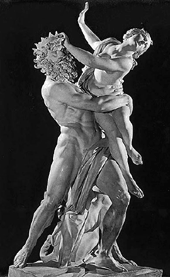
Pluto’s rape of Persephone may sound rather Scorpionic but the Greeks repeatedly associated rape with the Centaurs, the primitive mistakes of the Sagittarian adventurer, perhaps. Would Persephone have been quite so keen to leave the Underworld if her lord was endowed with the attractions for which Scorpio is renowned ?!
The Encylopedia Brittanica authoritatively translates Pluto as the Rich One and we can all agree with Sagittarius’ association with wealth. But finally it must surely come down to the simple empirical test : does, say, a Pluto / Saturn transit, make people do Sagittarian or Scorpionic things or a Pluto Ascendant give a Scorpio or Sagittarius personality ? My observation is that tiny distant Pluto’s transits can be extremely powerful, extremely disturbing, disorienting, and one of the strongest demonstrations of the power of astrology, so the evidence shouldn’t be too hard to find !
I have always associated Sagittarius with mistakes and learning, the traveller’s syndrome and I would argue these are characteristics Pluto is demonstrating quite forcefully ! I’m sure we will one day correct the astronomers’ error over this major planet, and perhaps they will even, one day, discover some respect for the ancient astrologers who knew Pluto, Uranus and Neptune (and their rulerships!) at least three thousand years ago. But similarly, I think our mistake could prove a valuable lesson, marking the point where modern astrology comes into its own as an objective, empirical science.
Mars Rules Scorpio
Pluto’s designation to the rulership of Scorpio has in many minds displaced Mars. Again, my observation of the character of Mars recognises a distinct Aries energy and initiative but also all the qualities of Scorpio, wherever he is placed and particularly when he features strongly. The water Signs are all about the emotions and of course this is what we hear in the tone of every voice, and an expressive voice is usually well served by Mars and other water features. This tone and music in our voices tells us immediately how someone is really feeling and a Scorpio might well say, ‘It’s not what you say but how you say it.’
This awareness endows Scorpio, perhaps above the other water Signs, with a critical appreciation of music and I believe observation will confirm that Mars has the sharpest ear both for music and the tone of a voice and is also perhaps the best exponent of these arts. This keen awareness and expression of feelings is not a million miles away from Scorpio’s racier (?) reputation which I have no doubt is immortalised in the portrait of Eros, Cupid, who represents all the irresistible power of the libido, an emotional instinct which Freud thought motivates much of what we do. Cupid’s arrows are the same symbol as the arrow of Mars, and though these may be an archetypal male symbol, we know the ladies have Mars in their chart too : otherwise I’m not sure how we shy gentlemen would get on ! These are all qualities which I suggest we can observe in Mars but which we will find singularly absent when we observe Pluto who is neither, of himself, sexy nor musical nor critical nor expressive, intense, emotional or, exactly, exciting. (Some astrologers say Mars still rules Scorpio with these qualities while Pluto’s Scorpio qualities are subtler and deeper but we’d never pretend Neptune’s Piscean nature is at all obscure and it seems it’s really a tacit admission that we can’t put our finger on Pluto’s Scorpio qualities at all.)
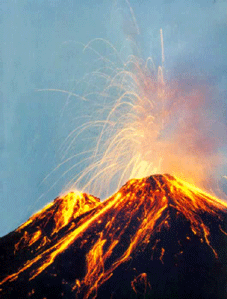 Mars’ physical nature reveals huge active volcanoes which assure us his Aries fires
Mars’ physical nature reveals huge active volcanoes which assure us his Aries fires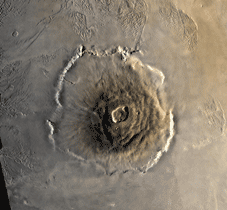 are still burning strongly (Olympus Mons is about three times the height of Everest) while his red colour is a massive presence of iron rusted red by water vapour which reminds us strongly of iron-clad Aries, the warrior who lives by his sword, and war still seems to be founded on the steel industry. There is still plenty of water ice, fixed water, both at the poles and beneath the surface while the famous ‘canals’ evidence a history of powerful rivers. Strong physical evidence for both cardinal fire and fixed water, Aries and Scorpio.
are still burning strongly (Olympus Mons is about three times the height of Everest) while his red colour is a massive presence of iron rusted red by water vapour which reminds us strongly of iron-clad Aries, the warrior who lives by his sword, and war still seems to be founded on the steel industry. There is still plenty of water ice, fixed water, both at the poles and beneath the surface while the famous ‘canals’ evidence a history of powerful rivers. Strong physical evidence for both cardinal fire and fixed water, Aries and Scorpio.


This is my adaptation of the Mars symbol to warn us all of his full, dangerous glory … with the German Pluto symbol which suggests the duality of this world passing beyond the final frontier to the unity of the spirit.
Earth’s Astrological Rulerships
Finally I want to look at the astrological nature of Earth. Earth doesn’t usually appear in the horoscope but if each planet has its astrological spirit then this should apply to Earth too. It is both more difficult and perhaps much easier to decide Earth’s zodiac rulerships. We cannot observe Earth in transits but we can try to assess the outstanding characteristics of all humans; after all, this exercise only makes sense if this spirit markedly affects us Earthlings, as it naturally should. I believe we should also be able to find this rulership reflected in the outstanding features of planet Earth.
Aries seems to be allotted to Earth on the Tree of Life and fits quite well: like Mars we still have plenty of fire in our belly, and just as Earth gives vent to this in regular volcanoes, our human lives are still often dominated by these violent eruptions of temper, whether in personal relationships, or, as we are all too aware of in the twentieth century, on the battlefield. This is a major feature of life on Earth and down the centuries into biblical times the urge to fight and the need to prepare for war have been one of the principle themes of life, politics, history. Aries suggests a constantly competitive atmosphere and we all know we only measure our success against someone else’s and there is competition in everything. Every zodiac spirit is strong in our collective life but I think we should acknowledge that Aries is particularly predominant in human life.
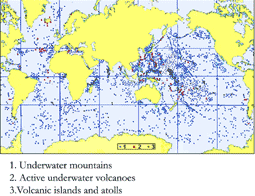 I would suggest the other main theme has been the accumulation of wealth and power.
I would suggest the other main theme has been the accumulation of wealth and power. 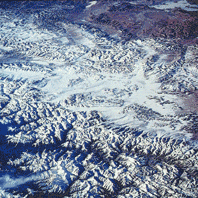 Not quite in the Sagittarian mode which is generally quite benign, though that element is also present but rather more harshly, even greedily and oppressively, the brutal Capricorn capitalist model of devil take the hindmost which is certainly highlighted in any analysis of multinational capitalism today. We may now be generally enjoying its luxuries in this country but it wasn’t always so and it certainly isn’t so everywhere today. Capricorn’s materialist values of money and power are all that most people believe in, even though they give them no real happiness and blind them to the real values of life and we might say the same of modern materialist science, blind to the most ancient and valuable science of all, because astrology is metaphysical and goes beyond the physical. Physically Earth has many mountains besides the Himalayas, the home of the Goat, and although the oceans have a ‘superficial’ predominance, we have rather more rock than water, with vast mountain ranges even under the sea.
Not quite in the Sagittarian mode which is generally quite benign, though that element is also present but rather more harshly, even greedily and oppressively, the brutal Capricorn capitalist model of devil take the hindmost which is certainly highlighted in any analysis of multinational capitalism today. We may now be generally enjoying its luxuries in this country but it wasn’t always so and it certainly isn’t so everywhere today. Capricorn’s materialist values of money and power are all that most people believe in, even though they give them no real happiness and blind them to the real values of life and we might say the same of modern materialist science, blind to the most ancient and valuable science of all, because astrology is metaphysical and goes beyond the physical. Physically Earth has many mountains besides the Himalayas, the home of the Goat, and although the oceans have a ‘superficial’ predominance, we have rather more rock than water, with vast mountain ranges even under the sea.

History can be seen as a sharp uneasy square between Capricorn and Aries, a materialist obsession with money, riches and power and then its reckless destruction in cruel wars, bloodletting, which seem to come round almost every generation. But we see these traits just as much in individuals as in history at large, when a reckless affair or row destroys everything a couple have built up, or our competitive greed means we are never satisfied when we have got much more than enough.
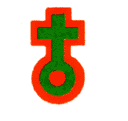 I believe our horoscopes should recognise the Earth as perhaps the most influential planet of all, at the centre of the chart, if we are to truly portray our celestial natures. We are Earthlings and it would be odd if Earth didn’t have an influential astrological rulership.
I believe our horoscopes should recognise the Earth as perhaps the most influential planet of all, at the centre of the chart, if we are to truly portray our celestial natures. We are Earthlings and it would be odd if Earth didn’t have an influential astrological rulership.
Of course I have only mentioned the excesses of Aries and Capricorn to highlight their predominance, not to deny their positive qualities of energy, enterprise, responsibility, and much more….
Astrology as a Science
This has necessarily been a condensed review of a big subject, or several big subjects : perhaps each rulership issue really deserves a separate full presentation, not to mention rulership itself ! I do treat them more fully in this booklet but rather than making a watertight case, I really want to stimulate a debate. My main theme throughout has been to point a direction towards empirical astrology which challenges everything by looking for objective evidence in a chart, perhaps particularly on these big questions such as the rulerships of Pluto, Mars and Earth.
My secondary theme has been to point a direction towards that other great scientific tool, logic and deduction. If we follow this principle we can probably go a long way towards the ultimate goal of understanding how astrology works and rulership is a good place to begin. It is a logical conclusion that the Sun has created the spiritual spectrum of the zodiac Signs and the Houses and that these are embodied and energised by the metaphysical power of the planets, in accord with their physical natures, perhaps also partly defined by their positions in the Solar System.
Astrology is the greatest of all the sciences because it offers the knowledge and insight into what really makes us tick and what makes the world tick : it shows us that we are not living in the crude, mechanistic material world many believe in but an exquisitely beautiful world where the physical reality is just the visible base spirit, the earth element, subject to the higher spirits, our emotions, our ideas, our intuition, and the immortal Spirit in our hearts, which is where our real happiness and life are to be found. This supreme science can lead man towards a wonderful destiny, the knowledge of himself and his world, and true, compassionate mastery but we will only achieve this pre-eminent recognition if we are prepared to ask hard questions, to establish unshakeable foundations on which to build our spiritual ziggurats, our high temples to the stars and the gods. But let our questioning be generous and open-minded as well as critical.
An expanded version of this speech is available as a booklet on the Sales Page.